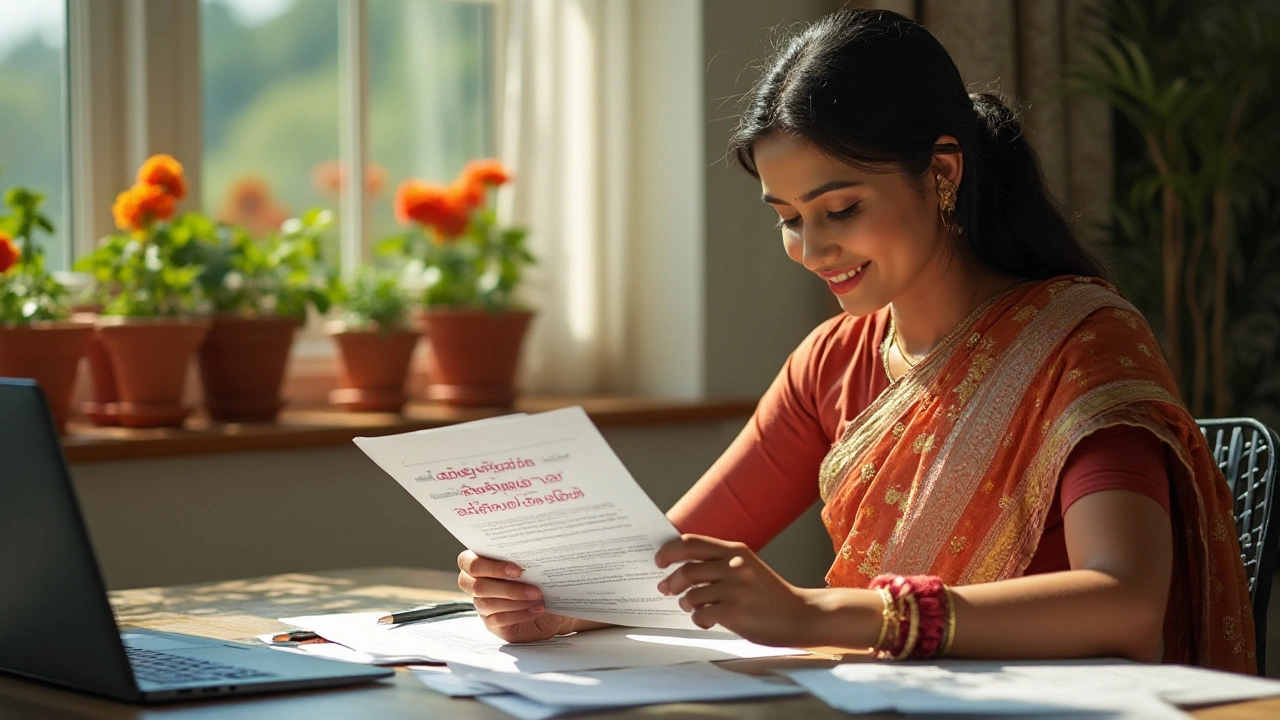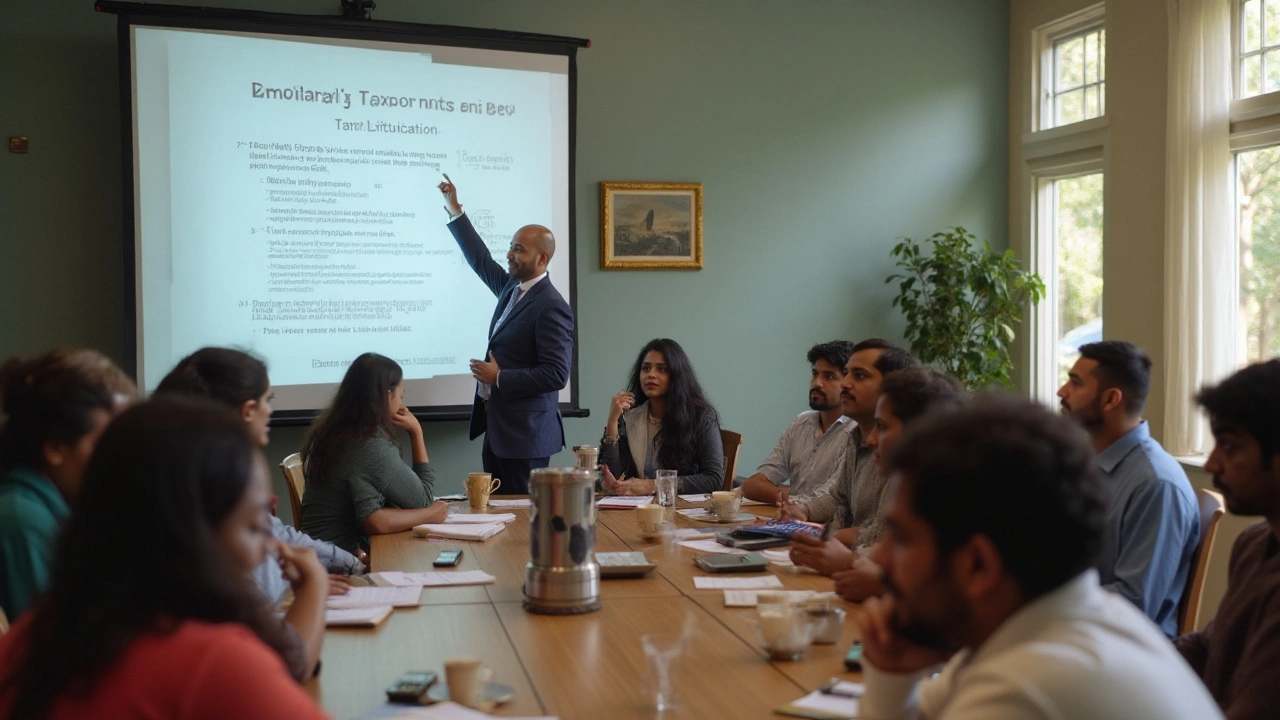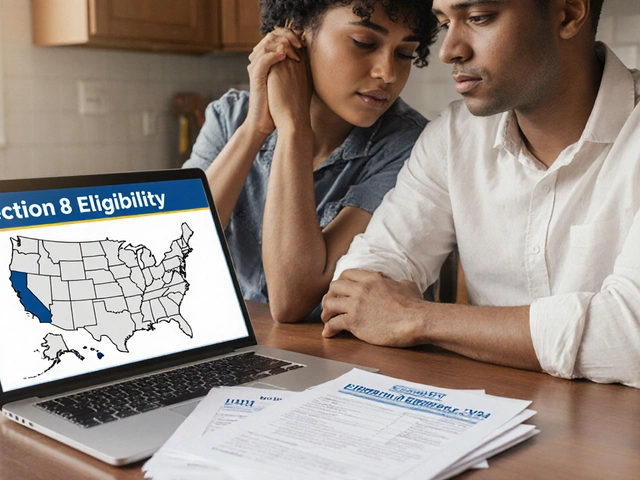Guide to Paying Personal Property Tax in Virginia

Paying personal property tax in Virginia might seem like a complex task, but with the right guidance, it becomes significantly easier. Residents of the state have obligations that extend to both real estate and personal assets such as vehicles, and understanding this can save a lot of stress down the line.
In this article, we will untangle the web of tax assessments, deadlines, and payment methods specific to Virginia. Whether you're a seasoned homeowner or someone who just bought their first car, this guide will provide you with valuable insights. From deductions and exemptions to avoiding penalties, you'll find everything you need to handle your personal property tax confidently.
- Understanding Personal Property Tax in Virginia
- Assessments and Valuations
- Payment Methods and Deadlines
- Deductions and Exemptions
- Tips for Avoiding Late Fees and Penalties
Understanding Personal Property Tax in Virginia
Virginia employs a unique system to assess personal property tax, one that affects a broad range of assets beyond just real estate. Typically, personal property includes tangible items like vehicles, boats, trailers, and business equipment. The Commonwealth considers these items as part of the taxable base to fund important public services. Residents often find it surprising that their vehicles are subject to recurring tax assessments. Each locality within Virginia sets its own tax rate, and this variance means that you might be paying a different amount compared to someone living just a few counties away. Tagging your vehicle with the right location is crucial as misidentification can lead to incorrect tax burdens or penalties.
The process begins with an assessment, which is essentially an estimate of your property's fair market value. For vehicles, factors like the make, model, year, and condition come into play, often determined using data from respected pricing guides. State law mandates that the assessments reflect mid-year values to ensure fairness. It raises an interesting point about timing; a newer car bought later in the year might incur a prorated tax, saving some out-of-pocket expense. That being said, many residents aren't fully aware of how these valuations directly impact their tax bill. To understand valuation better, the inclusion of the 'specific-factored' element is inevitable, allowing reassessments reflective of depreciation or market shifts to take place.
The state also sets apart special instances such as the High Mileage Adjustment for vehicles, a perk that can significantly lower your assessed value if your car racks up considerable mileage annually. It's worth checking with your local tax authority to see if your vehicle qualifies, as not every jurisdiction implements this provision uniformly.
According to a report by the Virginia Association of Counties, "Proper valuation is key to tax equity, ensuring the correct funding of services without overburdening taxpayers." Thus, proactive engagement with your local tax office is wise to make sure valuable credits aren't missed. There's often more than meets the eye, and shrewd property tax management can lead directly to savings in your financial bottom line.While unique to Virginia, the tangible property tax system showcases a paradigm of locality-driven revenue collection which invites a degree of perplexity yet offers personalized adjustments respecting community-specific needs. These efforts resemble a sprawling mosaic that mirrors the diversity and autonomy cherished in Virginia's governance model. Always be aware of updates or shifts in policy that might affect your personal tax situation. Becoming knowledgeable of these intricacies empowers residents to act confidently come tax time, reducing the chances of unwelcome surprises when the tax notice arrives.
Assessments and Valuations
In Virginia, the process of assessing personal property for tax purposes is carried out annually. This means that each year, residents can expect their items such as vehicles to be evaluated for their taxable value. The state relies heavily on market values to determine these assessments, and typically, the calculation is based on the value of the property as of January 1st of the tax year. With vehicles, for instance, the National Automobile Dealers Association (NADA) provides guidelines for valuation, ensuring a standardized approach. It's a practice that aims to keep assessments fair and consistent, applying universal standards across the board.
Most counties in Virginia have an established system to ensure accurate valuations, which might involve residents providing updates on high-value personal items. These declarations help the taxation authority keep records current, preventing any discrepancies. Often, individuals new to Virginia might be surprised by this system, especially if they came from states with less formalized assessment procedures. A significant aspect of the assessment is its reliance on local data, a practice designed to reflect the economic realities of individual regions. This local approach means that urban and rural areas might see different valuation standards based on local economic conditions.
Understanding your assessment effectively is crucial, especially if you're looking into possible appeals. If you think your property's assessed value is inaccurately high, Virginia gives you the right to contest this. The process usually starts at the local commissioner of revenue's office. 'Assessments are an approximation of value which can be challenged, especially when market conditions affect the worth of personal properties,' notes a local tax professional familiar with Virginia's practices.
In terms of Virginia property tax assessments, clarity is key. Stay informed by regularly reviewing the notices you receive about your property's values. It’s also worth contacting your local tax office for clarifications if needed. They can offer further insights into how values are determined and disclose any adjustments or changes in the assessed valuation framework. These conversations can help dispel myths and ensure you're not overpaying due to misunderstandings around what and how properties are valued.
It's generally intriguing how demographic and economic changes in the state might influence these assessments. A sudden influx of population or developments can drive up valuations significantly, adjusting the tax dynamics. The idea of assessments and valuations might seem overwhelming at first, but once you understand the basic principles, they become invaluable tools for managing one’s financial and tax responsibilities. It all comes down to being proactive and vigilant about the information available and verifying its appropriateness regularly.

Payment Methods and Deadlines
Understanding the intricacies of paying your Virginia personal property tax is vital to maintaining good financial standing. In Virginia, this tax is typically imposed by local municipalities and counties. It covers various tangible properties, with vehicles being the most common. The deadlines for payment vary slightly depending on where you live within the state. Generally, personal property taxes are billed annually, with due dates often landing by June 5 or December 5, aligning with the local government's fiscal calendar. Failing to pay by these dates might result in accrued interest and penalties, which can further complicate one's financial responsibilities.
When it comes to the methods available for tax payment, Virginia offers residents a variety of options to ensure ease and convenience. Traditional methods include paying in person at your local commissioner's office or through mail via checks or money orders. An increasing number of localities also enable payments through online portals, which can be a much more effortless and time-saving approach. Online payments can generally be made using credit cards or electronic checks. While convenient, you should be aware of any potential service fees associated with these electronic transactions. A quote from a notable tax expert highlights this tendency:
“Technology is revolutionizing tax payments, but one should be vigilant about online transaction fees which can add up over time.”For those who prefer more personal interactions or if online systems are not accessible, telephone payments are often available. This allows people to pay using their credit card details by speaking directly to a representative. Some counties also accept installments, letting you split your payments throughout the year. This can be an advantageous option for those on a tight budget, enabling better cash flow management. It's important to check with your local tax authority to see if this option is available for you. Automatic bank drafts, often referred to as ACH payments, are another method offered by some jurisdictions. It is an efficient way to ensure your taxes are deducted directly from your bank account on the due date, reducing the risk of late payments and penalties.
Lastly, adhering to deadlines is crucial, given the stringent penalties for late payment. Interest on unpaid taxes in Virginia can accrue at an annual rate of 10%, creating a hefty financial burden if neglected. It is smart to have reminders set up for tax due dates and explore options, such as the aforementioned automatic drafts, if you worry about forgetting. You might even explore appealing your tax assessment if you believe you've been overvalued, which could lead to reduced taxes. While the process might seem daunting initially, staying organized and informed can ease the anxiety often associated with tax payments and ensure you are never at odds with your tax obligations.
Deductions and Exemptions
When it comes to managing your Virginia personal property tax, understanding the landscape of deductions and exemptions can result in significant savings. Certain categories of property may qualify for exemptions or reduced tax rates, which vary by locality within the state. For instance, active-duty military personnel often benefit from specific exemptions if their home state is outside Virginia. In some cases, individuals with disabilities or senior citizens may qualify for relief or reductions, based on local ordinances.
One of the more widespread deductions available is for vehicles. If your vehicle is not used for personal transportation but rather for business, it might qualify for a different assessment category, thus lowering your tax liability. Additionally, vehicles that are considered 'antique'—which typically means they are at least 25 years old and only used for shows or parades—often have a negligible tax, provided they meet certain conditions outlined by local jurisdictions.
"Virginia recognizes the importance of supporting specific groups and individuals through well-structured tax relief programs," says John Thompson, a senior analyst at the Virginia Tax Policy Division. His insights underscore the need for staying informed about state and local tax benefits, particularly for those managing complex financial portfolios.Municipalities might offer additional relief measures to encourage behaviors that benefit the community, like environmentally friendly transportation or energy-efficient upgrades. In some places, hybrid or electric vehicles enjoy reduced tax rates as part of an effort to promote sustainable practices. Always check with your local assessor's office for the most accurate information regarding these opportunities, as the application process and qualifications can differ.
If you're a resident contemplating an upgrade to your home, like solar panels or efficient HVAC systems, it's also worth investigating whether Virginia offers state-level tax credits or deductions. While these credits are typically not directly tied to personal property tax, they can impact your overall tax strategy, freeing up resources that might help you cover other expenses.
Overall, the key to benefiting fully from these deductions and exemptions is staying informed and proactive. Participating in community workshops or consulting a local tax advisor can provide personalized insights and enhance your understanding of the specific benefits available to you. By leveraging these resources, residents can make the most of their property tax payments, leading to reduced financial burdens over time.

Tips for Avoiding Late Fees and Penalties
Understanding the pitfalls of late fees and penalties when paying your Virginia personal property tax is crucial to maintaining your financial health. The consequences of missing payment deadlines or underestimating your obligations can bring unwelcome surprises. One of the best strategies is to set up direct reminders well in advance of due dates, ensuring you never miss a payment. Your local county website will typically list the deadlines and payment options, so bookmarking this page or setting alerts on your phone reaps real benefits, almost like having a personal accountant at your fingertips.
Paying on time not only helps you avoid late fees but can also qualify you for early payment discounts. Some localities in Virginia encourage promptness by offering such incentives. Being proactive with your payments can prevent accruing interest on late fees and minimize the hassle of dealing with collections. Remember, penalties can add up quickly, making planning and regular check-ins with your local tax office a smart decision. It's about knowing how and when the assessment occurs, and being able to pay confidently, without the last-minute scramble.
If you're new to owning taxable property, it might be worth consulting with a tax professional or attending local workshops that explain the nuances of Virginia property taxes. These resources provide tailored advice to alleviate any personal confusion and offer insight into any reduction programs you might qualify for. These workshops might share valuable insider tips, like the importance of updating your records, ensuring your car is correctly registered, and understanding how local policies affect your particular region. Staying informed is one of the simplest, yet most effective, measures to safeguard against penalties.
Another effective tool is creating a financial buffer, or an emergency tax fund, that prepares you for any unforeseen adjustments or increases. Virginia residents sometimes face updated valuations that could raise tax burdens unexpectedly. Building a reserve fund over time gives you the flexibility to handle these changes without stress. It's like an insurance policy against sudden tax hikes. Balancing your monthly budget with a small portion allocated toward this buffer can ensure you meet all financial commitments without falling behind.
In the digital age, automating transactions offers peace of mind. Many localities in Virginia provide online payment systems where residents can set up recurring payments. This ensures consistency and allows you more time to focus on other priorities. Automating does not absolve you of responsibility, though; regular monitoring of your account is necessary to confirm payments are processed. Technology helps, but constant vigilance remains the truest ally in maintaining your tax health. Virginia tax payment process is achievable if you're methodic about managing it without procrastination.
Talking to neighbors and friends in your locality who have navigated the personal property tax scene can unveil practical insights. Simply asking about their experiences can yield unspoken rules of thumb or less-known facts. Embracing community wisdom combines shared efforts in keeping informed, reducing payment oversight. After all, when everyone plays by the same rulebook, nobody ends up paying more than they should.
"Time is money, especially when it comes to taxes. Being punctual pays dividends," advises financial expert, John Reeves.









Write a comment